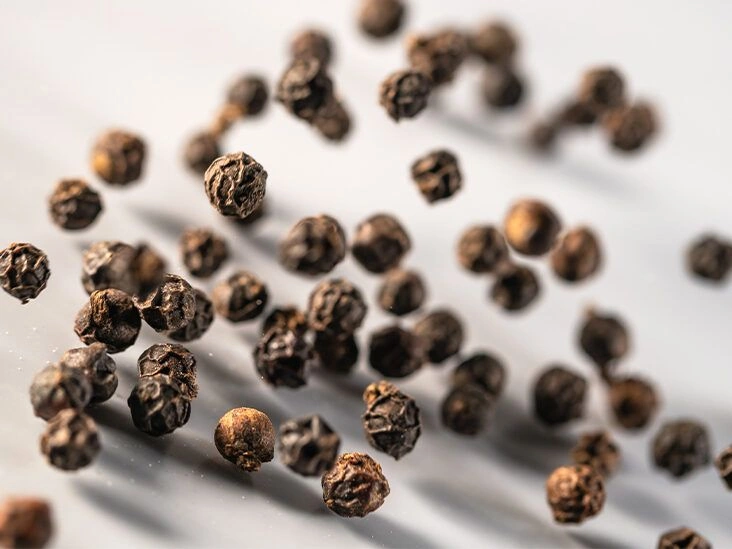Piperine, the active compound in black pepper, has been associated with various health advantages. BioPerine is a standardized piperine extract commonly included in dietary supplements that may enhance nutrient uptake, help regulate blood sugar, combat inflammation and cancerous cells, and support cognitive health. That said, additional research is necessary to confirm many of these effects.

Long celebrated as the “king of spices,” black pepper is a ubiquitous seasoning in kitchens around the world.
Its characteristic aroma and taste come from piperine, a constituent that researchers have linked to a wide range of potential health benefits.
Because most people use only a small amount of black pepper at each meal, some opt to take piperine in supplement form to increase their intake.
BioPerine is a patented form of piperine that contains at least 95% piperine in a formulation designed for good bioavailability. It appears in numerous supplements, either by itself or paired with other compounds such as turmeric.
This piece reviews some of the primary potential benefits attributed to BioPerine and piperine supplements.
1. May enhance nutrient uptake
Piperine has been shown to improve the absorption of a variety of nutrients and plant-derived compounds.
For instance, research indicates piperine can raise curcumin absorption by as much as 2,000%. Curcumin is the key active component in turmeric and is thought to have anti-inflammatory properties.
Additionally, studies suggest piperine can increase uptake of beta carotene, a beneficial phytochemical known to support immune health and act as an antioxidant to protect cells (2, 3).
Likewise, piperine may boost absorption of selenium, an important mineral with notable anti-inflammatory and anticancer roles (2, , ).
summaryBioPerine appears to increase the uptake of several helpful plant compounds, including curcumin, beta carotene, and selenium.
2. Might support cognitive function
Several animal studies indicate that BioPerine may offer various brain-supportive effects.
For example, one experiment found that piperine reduced inflammation and protected neuronal health in mice with chemically induced Parkinson’s disease.
Another mouse study suggests piperine extract might prevent cognitive decline related to Alzheimer’s disease.
In addition, a rat study showed piperine improved memory and safeguarded the myelin sheath — the insulating coating around nerve fibers in the brain and spinal cord — implying potential value in treating conditions such as multiple sclerosis (MS).
However, these findings come from animal models. Human trials are required to determine whether piperine produces comparable effects in people.
summaryAnimal research suggests piperine could protect neurons and improve memory, though human studies are still needed to confirm these outcomes.
3. May reduce inflammation
Inflammation is a protective immune response that helps defend the body against infection and injury.
When inflammation becomes chronic, though, it can damage long-term health and contribute to diseases such as cancer, cardiovascular disease, and diabetes.
Encouragingly, test-tube and animal research indicate piperine may have strong anti-inflammatory properties that could help control chronic inflammation.
For example, a cell-based study demonstrated that piperine extract shielded skin cells from ultraviolet (UV)-induced damage and inflammation.
In another laboratory study, piperine blocked production of multiple inflammatory markers in brain and spinal cord cells.
Older animal studies also suggest piperine can reduce inflammation related to conditions like arthritis and asthma.
Still, more human research is necessary to clarify how piperine supplements, including BioPerine, influence inflammation in people.
summaryLaboratory and animal studies show that piperine can lower indicators of inflammation, but human data are limited.
4. Could hinder cancer cell proliferation
Because of its antioxidant activities, some studies propose that BioPerine may help inhibit the growth, division, and spread of cancer cells.
Piperine has been examined for potential therapeutic effects against breast, prostate, and colon cancer cells.
Moreover, one in vitro study found piperine extract improved the efficacy of a therapy used to treat aggressive triple-negative breast cancer.
Keep in mind, however, that most of this research was conducted in test tubes using concentrated piperine; therefore, additional studies are required to understand how BioPerine might influence cancer progression in humans.
summaryIn vitro studies indicate piperine can suppress growth and spread of breast, prostate, and colon cancer cells, but more research is required to determine its effects in humans.
5. May help regulate blood sugar
Some evidence suggests BioPerine might support better blood sugar control through a few different mechanisms.
For instance, a test-tube study showed piperine increased cellular uptake of glucose from the bloodstream, which could help prevent hyperglycemia.
Animal studies indicate it may also help prevent insulin resistance, a condition in which the body’s response to insulin is impaired, reducing glucose transport into cells.
Additionally, one study in diabetic mice reported that piperine enhanced the activity of metformin, a common blood sugar–lowering medication.
Still, more human studies are needed to verify if BioPerine provides similar advantages in people.
summaryTest-tube and animal research suggests piperine could help stabilize blood glucose by promoting cellular glucose uptake, preventing insulin resistance, and improving the effect of diabetes drugs.
Safety and recommended amounts
There are no universally established dosing guidelines for piperine, but research indicates daily doses of 5–20 mg are generally safe and associated with few side effects (, 26).
BioPerine’s manufacturer suggests a dose of 5 mg taken three times per day for optimal results.
Because piperine can reduce blood sugar, consult your healthcare provider before taking BioPerine if you have diabetes.
Piperine may also alter the absorption or metabolism of some medications, including blood thinners and drugs used for insomnia, pain, and anxiety. If you take prescription medications, speak with your doctor before using BioPerine (2, , ).
summaryDoses of piperine between 5–20 mg per day are typically considered safe, but consult your doctor before use if you have diabetes or take medications.
The bottom line
Piperine is a valuable phytochemical present in black pepper. BioPerine is a patented, highly absorbable piperine extract featured in many supplements.
Research suggests piperine may improve nutrient absorption, aid blood sugar control, inhibit cancer cell growth, reduce inflammation, and support brain health.
However, because most evidence comes from animal or laboratory studies, more human research is required to confirm these potential benefits.
Also, piperine can lower blood glucose and interact with certain medications, so consult your physician before starting it.























Leave a Reply
You must be logged in to post a comment.